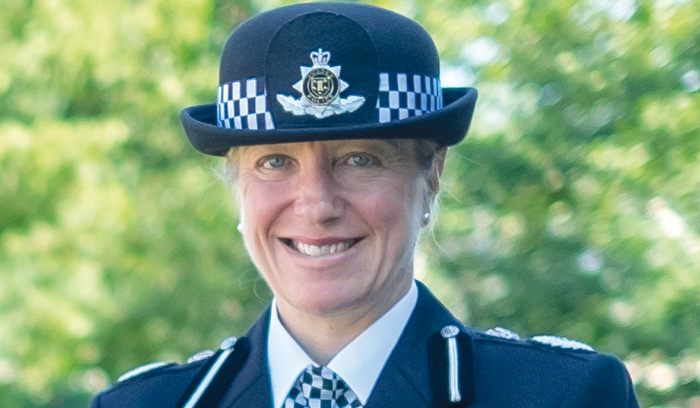Police must focus on keeping vulnerable young adults out of the criminal justice system, says new research
Chief Constable Jo Shiner says policing must be able to “identify and respond empathetically” to the vulnerabilities of young adults after new research shows more than half of 18 to 25-year-olds do not think the police understand them or the challenges they face.
The research published today (February 10) by the charity Revolving Doors Agency shows that young adults want their health and human needs to be prioritised so that they do not unnecessarily get dragged into the criminal justice system.
Revolving Doors says the Covid-19 pandemic has “laid bare and exacerbated” the poverty, mental ill-health, alcohol and drug problems experienced by many young adults. At the same time well-documented racial inequalities in our justice system have been brought into sharp focus, it said.
A survey of 689 young adults across England and Wales reveals that:
- Seven in ten believe that police treat them differently if they are from a deprived area, or if they are a person of colour;
- Vulnerable young adults with disabilities or mental health issues were less likely to have trust or confidence in police, and were less likely to think policing was fair or that it kept them safe;
- The more often young adults had contact with police, the less likely they were to have trust or confidence in them; and
- Of the young adults in recent contact with mental health services, 45 per cent were in contact with the police.
However, seven in ten young adults still believe that the police are a force for good.
Now young adults with experience of the criminal justice system, as part of the New Generation Campaigners, are launching a campaign to reduce arrests of vulnerable young adults for non-violent crime, and get police to divert them into support instead. They been brought together by Revolving Doors to explore how police can better respond to the needs of young adults.
An independent poll found the public wants police to handle non-violent crime differently:
- More than two thirds (68 per cent) of young adults, and 60 per cent of all adults, think police should divert people into support services if they are arrested for low-level and non-violent crimes like shoplifting or minor drug offences; and
- 75 per cent of young adults, and 60 per cent of all adults, agree that drugs should be treated as a health problem, instead of a crime.
Pavan Dhaliwal, chief executive of Revolving Doors Agency, said: “The findings of the survey and polling are clear; first, the current system is not working and is actually harming young people and secondly, there is public support for an different approach that helps young people address the underlying causes of their behaviour.
“Government and police leadership must focus on keeping vulnerable young adults out of the criminal justice system, especially when they’ve committed minor crimes. That is why our campaigners are calling for them to understand the issues facing young adults and divert them into support. Simply put, arresting these young people over and over again will not work.
“The pandemic has bought into sharp focus the need to tackle the underlying causes that lead to young people falling into the system, namely, poverty, trauma, and inequality. Now is the time to re-think our approach.”

Ms Shiner, the Sussex Police chief constable and National Police Chiefs’ Council lead for children and young people, said the work of Revolving Doors Agency and its New Generation Campaigners “gives us a perceptive insight into the views of young adults”.
In her foreword to the report – Understand us: A survey exploring young adults’ views and experiences of policing – she wrote: “Some of the feedback is difficult to read but will crucially help with continuing our work to increase trust and confidence between young people and the police.
“The lived experience of young adults and their relationship with policing is essential for us to understand. Without mutual trust, confidence, and understanding it is far more challenging to build upon the good work that policing does do to enable children and young people to live their best future lives.”
Ms Shiner added: “I know that my colleagues in the service understand that the transition to adulthood can be a challenging time. We are committed to a better understanding of how we are perceived by, and how we police, young adults.
“Crucially that requires us to understand their circumstances and their motivations. This report reminds us of what a crucial age young adulthood is; it is a time of huge transition and personal development. While some are nurtured into adulthood, others are struggling with past trauma, everyday poverty, and discrimination. If we are to serve this community appropriately, then policing must be able to identify and respond empathetically to those vulnerabilities, in partnership with other agencies.
“I will continue to strive to listen and act in a way, which engenders that trust, and enables us to truly police our younger communities by meaningful consent.”
Among the concerns highlighted by New Generation Campaigners in the report were:
- “If police focused on our potential and tried to understand us, we could start to build better lives and avoid getting pulled into the system”;
- “Growing up, my family always struggled. I wanted to support them and for us to be financially stable which is how I got involved in crime”; and
- “I had so much drive and motivation but nowhere to put it. If my needs had been recognised by the police and I’d been diverted into the right support, I could have avoided years of crime and had the chance to thrive”.
Responding to the research, police and crime commissioners (PCC) say diversionary initiatives for young offenders makes “absolute sense” and a number of services are already in place.
Julia Mulligan, North Yorkshire police, fire and crime commissioner, said: “Diversionary services break what can turn into a cycle of crime, with minor offences leading to much more serious ones in the future.
“I absolutely believe this approach makes sense, not just for those young people, women and men who stumble into the criminal justice system, but for everyone who will become victims if their action is left unchecked.
“As commissioner, I have invested in these services across North Yorkshire and York and I know they have made a difference. The traditional approach of sending people to court for minor offences simply does not work and often actually makes things worse. We need to be helping those who offend to reform and address underlying trauma so they stop offending once and for all.
“By supporting individuals, we can protect residents, homes and businesses, making our streets and our communities safer.”
West Midlands PCC David Jamieson said he has already invested in many services that focus on diverting people away from the criminal justice system and “provide them with the help and support they need to lead fulfilling lives away from crime”.
He added: “In the West Midlands we are already working to address the root causes of non-violent and low-level crimes and have a number of diversionary activities in place to support people and reduce crime.
“Diversionary activity is not only more effective in reducing crime than short sentences, but it is also much more cost effective and can save the taxpayer a significant amount of money.
“We should be investing in tackling the root causes of crime instead of picking up the pieces later down the line.”
Leicestershire PCC Lord Willy Bach added: “Protecting our young people and steering them away from a life blighted by criminality is not simply the right thing to do for the individuals, it also reduces demand on local services.
“There are many factors that increase the risk of young people coming into contact with the criminal justice system, from poverty and adverse childhood experiences to vulnerability and isolation. We must encourage them to embrace opportunity not criminality.
“I have always said that this is not something the police can, or should, tackle in isolation. Statutory and voluntary partners have a key role to play. However, the years of cutbacks have left youth services practically gasping for funding and I am proud that I have been able to help a large number of projects with financial support, but obviously I cannot plug the gap.
“This is a multi-agency issue, and we all have a responsibility to work together to deliver sustainable solutions.”


